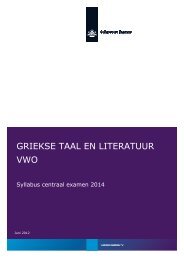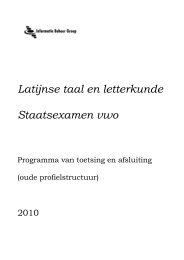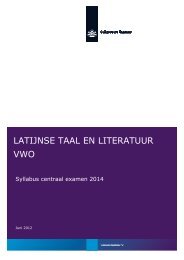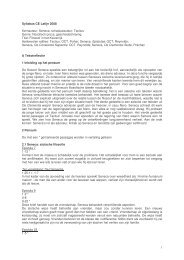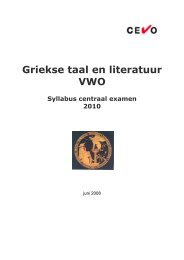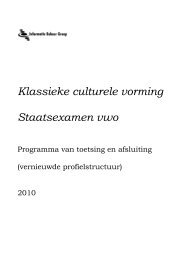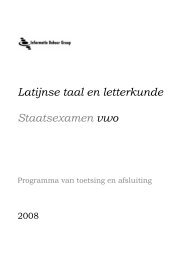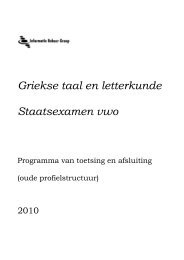Rome Wasn't Digitized in a Day - Council on Library and Information ...
Rome Wasn't Digitized in a Day - Council on Library and Information ...
Rome Wasn't Digitized in a Day - Council on Library and Information ...
You also want an ePaper? Increase the reach of your titles
YUMPU automatically turns print PDFs into web optimized ePapers that Google loves.
245<br />
The ARL report recognized that the massive amount of humanities materials that have been digitized<br />
with<str<strong>on</strong>g>in</str<strong>on</strong>g> open-access projects <strong>and</strong> commercially licensed sources will be comb<str<strong>on</strong>g>in</str<strong>on</strong>g>ed by researchers <str<strong>on</strong>g>in</str<strong>on</strong>g><br />
new ways, <strong>and</strong> that the research library will need to develop new strategies to work with both its users<br />
<strong>and</strong> other academic units to support digital scholarship as well as preservati<strong>on</strong> <strong>and</strong> curati<strong>on</strong> of digital<br />
data. Abby Smith has made similar arguments <str<strong>on</strong>g>in</str<strong>on</strong>g> her overview of how the research library will need to<br />
evolve <str<strong>on</strong>g>in</str<strong>on</strong>g> the twenty-first century to meet the needs of humanities scholars <str<strong>on</strong>g>in</str<strong>on</strong>g> particular:<br />
The accelerated development of digital humanities is an even more significant trend for<br />
research libraries, if <strong>on</strong>ly because humanists have been their primary clientele. Bey<strong>on</strong>d the<br />
<str<strong>on</strong>g>in</str<strong>on</strong>g>creas<str<strong>on</strong>g>in</str<strong>on</strong>g>g use of quantitative research methods <str<strong>on</strong>g>in</str<strong>on</strong>g> the humanities, there is a grow<str<strong>on</strong>g>in</str<strong>on</strong>g>g dem<strong>and</strong><br />
by humanists to access <strong>and</strong> manipulate resources <str<strong>on</strong>g>in</str<strong>on</strong>g> digital form. With the primacy of “datadriven<br />
humanities,” certa<str<strong>on</strong>g>in</str<strong>on</strong>g> humanities discipl<str<strong>on</strong>g>in</str<strong>on</strong>g>es will eventually grow their own doma<str<strong>on</strong>g>in</str<strong>on</strong>g>specific<br />
<str<strong>on</strong>g>in</str<strong>on</strong>g>formati<strong>on</strong> specialists. While perhaps tra<str<strong>on</strong>g>in</str<strong>on</strong>g>ed as librarians or archivists, such<br />
specialists will work embedded <str<strong>on</strong>g>in</str<strong>on</strong>g> a department or discipl<str<strong>on</strong>g>in</str<strong>on</strong>g>ary research center (Smith 2008).<br />
Many scholars <strong>and</strong> librarians have also stressed the need for research libraries to exp<strong>and</strong> their<br />
preservati<strong>on</strong> missi<strong>on</strong> to <str<strong>on</strong>g>in</str<strong>on</strong>g>clude complicated digital objects <strong>and</strong> not just scholarly research<br />
publicati<strong>on</strong>s. 697 Michael Fraser highlighted the importance of the ability of digital repositories to<br />
preserve more complicated c<strong>on</strong>tent than just PDFs <str<strong>on</strong>g>in</str<strong>on</strong>g> the l<strong>on</strong>g-term <str<strong>on</strong>g>in</str<strong>on</strong>g>frastructure of VREs:<br />
Indeed, preserv<str<strong>on</strong>g>in</str<strong>on</strong>g>g the 'project', compris<str<strong>on</strong>g>in</str<strong>on</strong>g>g data, publicati<strong>on</strong>s, workflows <strong>and</strong> the 'grey'<br />
material of reports, notebooks <strong>and</strong> other forms of more nebulous communicati<strong>on</strong>s is important<br />
<str<strong>on</strong>g>in</str<strong>on</strong>g> a research envir<strong>on</strong>ment where much of the material is born <strong>and</strong> raised digital. The<br />
development of today's research by tomorrow's scholars depends <strong>on</strong> it (Fraser 2005).<br />
Similarly, <str<strong>on</strong>g>in</str<strong>on</strong>g> their process of creat<str<strong>on</strong>g>in</str<strong>on</strong>g>g a digital library of the Roman de la Rose, Choudhury <strong>and</strong> St<str<strong>on</strong>g>in</str<strong>on</strong>g>s<strong>on</strong><br />
described the new dual resp<strong>on</strong>sibility of libraries to provide both physical <strong>and</strong> digital preservati<strong>on</strong>:<br />
For while the curati<strong>on</strong> of physical codices will rema<str<strong>on</strong>g>in</str<strong>on</strong>g> an essential role for libraries, the<br />
collecti<strong>on</strong> <strong>and</strong> curati<strong>on</strong> of digital objects will assume greater importance for libraries of the<br />
future, <strong>and</strong> the <str<strong>on</strong>g>in</str<strong>on</strong>g>frastructure, budgetary priorities, <strong>and</strong> strategic plans of library organizati<strong>on</strong>s<br />
would do well to account for this so<strong>on</strong>er rather than later (Choudhury <strong>and</strong> St<str<strong>on</strong>g>in</str<strong>on</strong>g>s<strong>on</strong> 2007).<br />
A variety of research has also proposed that new organizati<strong>on</strong>al structures bey<strong>on</strong>d the traditi<strong>on</strong>al<br />
research library or <str<strong>on</strong>g>in</str<strong>on</strong>g>stituti<strong>on</strong>al repository (IR) may be needed to support such digital preservati<strong>on</strong> <strong>and</strong><br />
curati<strong>on</strong> activities. 698 Sayeed Choudhury has recently described how Johns Hopk<str<strong>on</strong>g>in</str<strong>on</strong>g>s University created<br />
its IR as “a “gateway” to the underly<str<strong>on</strong>g>in</str<strong>on</strong>g>g digital archive that will support data curati<strong>on</strong> as part of an<br />
evolv<str<strong>on</strong>g>in</str<strong>on</strong>g>g cyber<str<strong>on</strong>g>in</str<strong>on</strong>g>frastructure featur<str<strong>on</strong>g>in</str<strong>on</strong>g>g open, modular comp<strong>on</strong>ents” (Choudhury 2008). As was argued<br />
by Abby Smith, they found that new roles were develop<str<strong>on</strong>g>in</str<strong>on</strong>g>g al<strong>on</strong>g with this new <str<strong>on</strong>g>in</str<strong>on</strong>g>frastructure<br />
<str<strong>on</strong>g>in</str<strong>on</strong>g>clud<str<strong>on</strong>g>in</str<strong>on</strong>g>g the development of “data humanists” or “data scientists.”<br />
In a recent article <str<strong>on</strong>g>in</str<strong>on</strong>g> Digital Humanities Quarterly, W. A. Kretzschmar has also proposed that the <strong>on</strong>ly<br />
way to effectively support l<strong>on</strong>g-term <strong>and</strong> large scale humanities comput<str<strong>on</strong>g>in</str<strong>on</strong>g>g projects may be to f<str<strong>on</strong>g>in</str<strong>on</strong>g>d a<br />
“stable <str<strong>on</strong>g>in</str<strong>on</strong>g>stituti<strong>on</strong>al sett<str<strong>on</strong>g>in</str<strong>on</strong>g>g” for them (Kretzschmar 2009). Crane, Babeu, <strong>and</strong> Bamman (2007) have<br />
similarly argued that humanists may need to “develop new organizati<strong>on</strong>al structures to develop <strong>and</strong><br />
ma<str<strong>on</strong>g>in</str<strong>on</strong>g>ta<str<strong>on</strong>g>in</str<strong>on</strong>g> the services” <strong>on</strong> which they <str<strong>on</strong>g>in</str<strong>on</strong>g>creas<str<strong>on</strong>g>in</str<strong>on</strong>g>gly depend. The need to c<strong>on</strong>sider what type of<br />
697 See Sennyey (2009) for a thorough overview of how academic libraries need to redef<str<strong>on</strong>g>in</str<strong>on</strong>g>e their missi<strong>on</strong> to meet the needs of digital scholarship.<br />
698 For example, the Digital Curati<strong>on</strong> Centre (http://www.dcc.ac.uk/) <str<strong>on</strong>g>in</str<strong>on</strong>g> the United K<str<strong>on</strong>g>in</str<strong>on</strong>g>gdom was launched <str<strong>on</strong>g>in</str<strong>on</strong>g> 2004 to provide advice <strong>and</strong> tools for the<br />
curati<strong>on</strong> of research data. Its website c<strong>on</strong>ta<str<strong>on</strong>g>in</str<strong>on</strong>g>s an extensive resources directory as well as a catalog of digital curati<strong>on</strong> tools.






